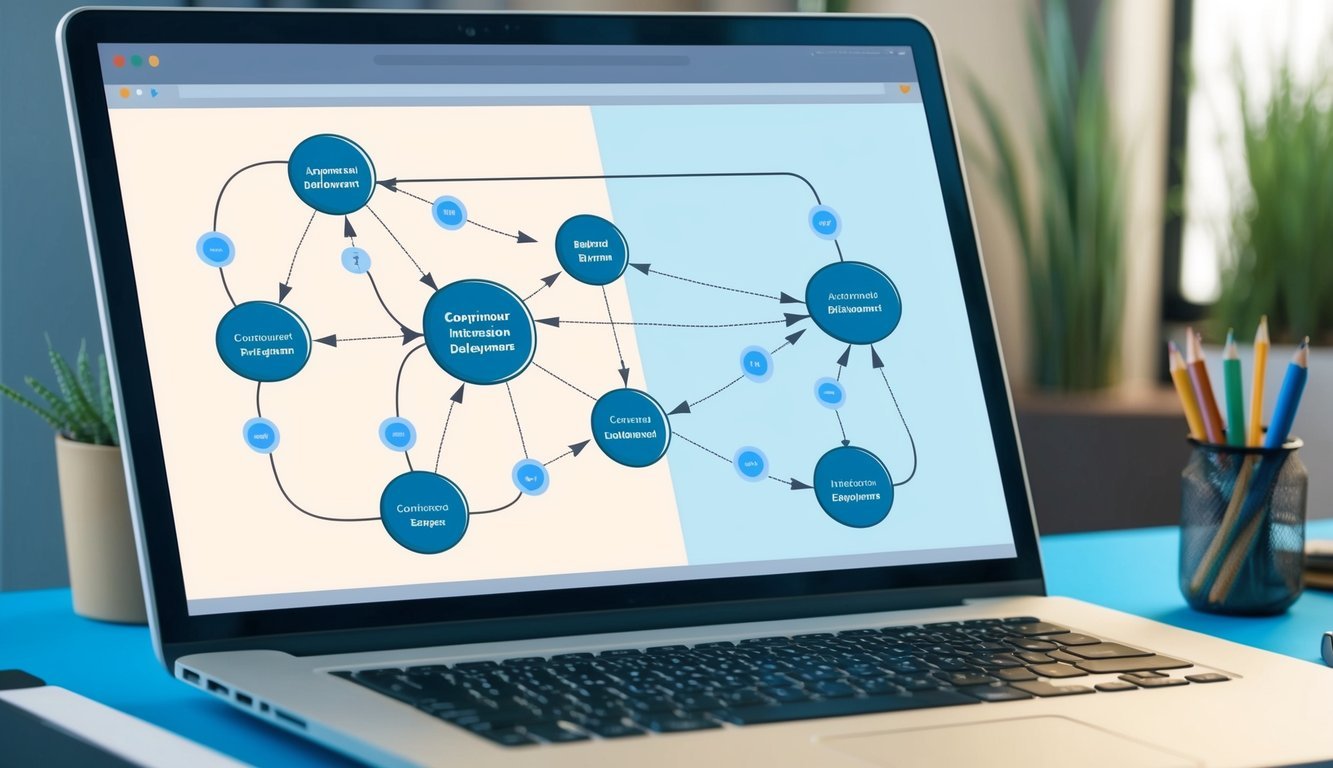Want to sharpen your software development skills? CI/CD might just be the secret sauce you’re looking for! These nifty tools not only make coding faster but also a whole lot smarter.
alt=”A computer screen displaying four different CI/CD course icons with progress bars and ratings”>
Curious about CI/CD? You’re in for a treat! We’ve handpicked four fantastic courses that cover everything you need to know about this exciting tech. Whether you’re a newbie or a seasoned developer, these classes will take you from the basics to some cool advanced tactics.
Get ready to elevate your coding game!
1) Codecademy’s CI/CD Pipeline
Hey there! Ready to dive into CI/CD? Codecademy’s got your back with their awesome course on this subject.
You’ll kick things off by learning what CI/CD pipelines really are.
It’s like getting the ABCs of modern software development down pat.
The course neatly breaks down all the key components of the pipeline.
You’ll get the lowdown on continuous integration, delivery, and deployment.
It’s all geared toward making your coding life a lot smoother.
Plus, you’ll snag some hands-on experience with automation.
This is where the fun really starts! You’ll learn how to set up the right tools to do the heavy lifting for you.
By the end, you’ll find yourself chatting about DevOps like a pro.
You’ll understand how CI/CD plays a crucial role in the grand scheme of software development.
Looking to boost your skills? This course is a superb jumping-off point.
It’s practical, engaging, and gives you in-demand skills!
2) Udacity’s DevOps Engineer Nanodegree
Dreaming of being an AWS Cloud DevOps pro? Check out the Cloud DevOps Engineer Nanodegree from Udacity.
This program teaches you how to design and deploy infrastructure as code, which sounds fancy, right?
You’ll learn to build CI/CD pipelines and dive into deployment strategies that actually work.
Topics like Docker, Kubernetes, and microservices? You’ll be getting your hands dirty with all of them!
Udacity estimates you’ll finish the course in around four months, assuming you study for about ten hours a week.
But hey, some students wrap it up in as little as 2.5 months if they hustle!
The best part? You’ll tackle real-world projects that help you apply everything you’ve learned.
No fluff here—just hands-on experience with the tools the industry is buzzing about.
One standout section is the course on CI/CD pipelines, monitoring, and logging.
You’ll get to automate the connections between developers and the cloud, which is super cool.
3) Pluralsight’s Continuous Integration and Continuous Deployment
Looking to learn CI/CD from experts? Pluralsight’s got your back! Their Continuous Integration course is an excellent starting point.
You’ll get the hang of setting up a build server and creating build scripts.
The course also covers important topics like code compilation, testing, and static code analysis.
But that’s not all.
Pluralsight has a course on creating a modern CI/CD pipeline using Jenkins.
Interested in getting hands-on with a popular CI/CD tool? This one’s for you!
These courses are part of Pluralsight’s broader DevOps offerings.
They’ll help you see how CI/CD fits into the whole DevOps picture, and you’ll gain real-world experience with crucial tools and techniques.
If you’re super serious about it, their DevOps certification courses can help validate your expertise, which is a big plus in today’s job market.
You’ll even learn how to automate and monitor your app’s lifecycle—making your software development process quicker and more reliable.
Plus, Pluralsight courses are often praised for being practical and straightforward.
They’re perfect if you’re ready to take your CI/CD skills up a notch!
4) Coursera’s CI/CD Pipeline with Jenkins

Alright, do you want to get deep into CI/CD with Jenkins? Coursera’s got a gem for you: the Continuous Integration & Continuous Deployment with Jenkins course.
You’ll learn all about building automation and integrating Git with Jenkins.
This course covers everything from Maven to Jenkins CLI and even Jenkins X. Exciting, huh?
Ever wondered how to set up Git with Jenkins? This course walks you through it step by step.
You’ll run shell commands and get practical experience throughout.
And there’s more! Coursera also offers a course titled 2022: CI/CD with Jenkins Ansible Kubernetes.
If you’re looking to boost your DevOps game, this one’s definitely worth a peek.
With these courses under your belt, you’ll be well on your way to mastering CI/CD pipelines.
They’re packed with hands-on modules designed for effective learning.
Understanding CI/CD Concepts

CI/CD helps teams build and release software at lightning speed.
It leverages automation to catch bugs earlier and deploy code faster—music to every developer’s ears.
Continuous Integration Explained
So what’s Continuous Integration (CI) all about? It’s like merging code often—kind of like getting together for a team lunch.
You and your teammates add new code to a shared spot every day, which helps you spot and fix problems quicker.
If you’re looking to jump into setting up CI pipelines, GitLab’s CI/CD course is a fantastic choice.
You’ll learn to use tools that automatically check your code, running tests and looking for errors every time new code hits the shared space.
CI smooths out teamwork.
It prevents conflicts when multiple people are working on the same code, catching mistakes early and making them easier to fix.
Continuous Delivery vs. Continuous Deployment
Now, Continuous Delivery (CD) takes everything from CI to a state where it’s ready to launch.
It’s like making sure your app could go live anytime without a hitch!
Coursera’s CI/CD course dives into both delivery and deployment.
You’ll see how to set up systems that get your code ready for users super quickly.
Continuous Deployment kicks it up a notch.
It automatically puts your code live without any manual checks.
It’s speedy but requires robust automated tests.
Talk about fast-tracking your releases!
The perk of CD? You get to deliver updates to users faster, making their experience better and smoothing out issues on the fly.
Choosing the Right CI/CD Tools

Picking CI/CD tools can feel like a daunting task with all the options available.
Let’s check out some popular platforms and what to keep in mind as you choose.
Popular CI/CD Platforms
Jenkins is a classic open-source tool that’s super flexible.
You can customize it with tons of plugins to make it suit your needs.
If you’re already using GitLab for version control, then GitLab CI is a no-brainer.
It’s built right in, so no extra setup required!
CircleCI is both user-friendly and cloud-ready.
It’s a breeze to get started and adjusts easily as your projects grow.
Travis CI is a favorite for open-source projects.
It integrates effortlessly with GitHub and is known for having a straightforward config file.
Key Features to Consider
When you’re on the hunt for the perfect CI/CD tool, think about a few key features:
- Easy setup: Look for something that’s quick to get going.
- Good integrations: It should play well with your other dev tools.
- Scalability: Make sure it can handle your project’s growth.
- Cost: Some tools are free, while others can put a dent in your wallet. Choose what fits your budget.
- Support: Good documentation and helpful support are crucial.
Search for tools that help you automate testing and deployments.
This will save you time and help catch bugs early on.
Also, check if the tool supports containerization.
It can simplify deployments across different environments, making everything consistent and manageable.
Frequently Asked Questions

Got questions about CI/CD courses, certifications, or key concepts? Let’s break it down together!
What are some recommended CI/CD courses I can take online?
There are tons of options for online CI/CD learning! Codecademy’s CI/CD Pipeline is a fantastic choice for beginners.
If you’re after something more advanced, Udacity’s DevOps Engineer Nanodegree is definitely worth a look.
Where can I find high-quality CI/CD courses for free?
Free doesn’t have to mean low-quality! Coursera’s CI/CD Pipeline with Jenkins is a great no-cost option.
There are also free CI/CD modules on edX and FutureLearn that are worth checking out!
Anyone got suggestions for cool CI/CD certifications, maybe even some free ones?
You bet! GitLab offers a free CI/CD Associate certification.
For something more recognized, the AWS Certified DevOps Engineer is a highly regarded choice in the industry.
What’s the buzz on the best CI/CD course on Reddit?
Reddit users often rave about Pluralsight’s Continuous Integration and Continuous Deployment course.
They love its hands-on approach and real-world examples.
Are there any certifications for Azure CI/CD worth checking out?
Absolutely! The Microsoft Certified: DevOps Engineer Expert is a top-notch pick for Azure CI/CD, covering crucial aspects of implementing CI/CD in Azure environments.
What’s a crucial thing to understand when diving into CI/CD?
Automation is where it’s at in CI/CD.
It’s all about setting up systems that automatically build, test, and deploy your code, saving you time and reducing errors.
Plus, having a solid grasp of version control systems like Git is super important.

